Shenzhen Wesort Optoelectronics Co., Ltd.
Address:Building 29, Longwangmiao Industrial Zone, Fuyong street, Bao'an District, Shenzhen, Guangdong Province, China.
Phone:+86 181 2370 6862
In modern agriculture, food processing, and recycling, quality control plays a vital role. This is where an optical sorter comes in. Many buyers often ask: What is an optical sorter? What does it do? How much does it cost? And how is WESORT optical sorter different from others? Let’s break it down step by step.
An optical sorter (also called a color sorter or vision sorting machine) is an advanced device that uses cameras, sensors, and artificial intelligence to automatically identify and separate products based on color, size, shape, or defects.
These machines are widely used in:
Agriculture: rice, coffee beans, nuts, corn, seeds.
Food processing: removing impurities and defective products.
Recycling: plastic flakes, glass, metal sorting.
Mining: sorting ores by color and grade.
By applying real-time image processing, an optical sorter improves product purity and efficiency, while reducing human labor costs.
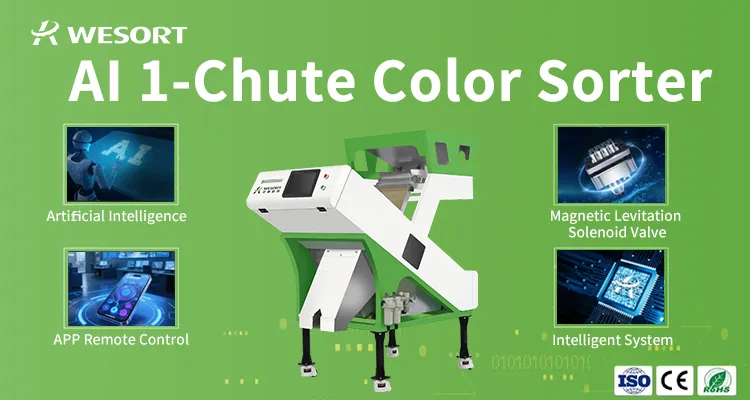
An optical sorter detects and separates unwanted materials such as:
Defects: moldy, broken, discolored kernels in coffee beans or nuts.
Foreign objects: stones, glass, plastic in food.
Impurities: black spots in plastic pellets or carbonized particles.
For example, in coffee processing, an optical sorter removes black, over-fermented beans to guarantee premium coffee quality. In plastic recycling, it separates flakes by color, improving reprocessing efficiency.
In short, optical sorters increase product value, ensure food safety, and improve yield.
The cost of an optical sorter varies depending on its size, capacity, and technology:
Small-scale machines: around $5.000 – $15.000.
Medium-scale machines: $20.000 – $50.000.
Large industrial models: $80.000 or more.
Key factors that affect price include:
1. Sorting channels (number of chutes).
2. Detection technology (AI, multi-spectral, infrared).
3. Material type (coffee, nuts, rice, plastic, ore).
4. After-sales support and warranty.
While the investment may seem high, the return on investment is significant, as optical sorters greatly reduce waste and improve product value.
WESORT is a leading optical sorter manufacturer with more than 10 years of industry experience. Their machines stand out for several reasons:
AI & Big Data Algorithms: Precise recognition of color, size, and even subtle defects.
Belt-type Design: Gentle handling of materials like coffee beans and nuts, minimizing breakage.
Multi-material Compatibility: Capable of sorting coffee beans, rice, seeds, nuts, plastics, ores, and more.
Stable Performance: Designed for continuous 24/7 operation with low maintenance.
Global Service: Professional technical support and fast after-sales response.
Compared with traditional sorting methods, WESORT optical sorters deliver higher accuracy, better efficiency, and longer service life.
Conclusion
An optical sorter is more than just a machine—it’s a key investment for businesses that demand quality, safety, and efficiency. From food processing to recycling, optical sorters add measurable value.
If you’re looking for a reliable solution, WESORT optical sorter combines advanced AI technology, flexible design, and trusted global service.
👉 Learn more at www.wesortcolorsorter.com
In modern agriculture, food processing, and recycling, quality control plays a vital role. This is where an optical sorter comes in. Many buyers often ask: What is an optical sorter? What does it do? How much does it cost? And how is WESORT optical sorter different from others? Let’s break it down step by step.
An optical sorter (also called a color sorter or vision sorting machine) is an advanced device that uses cameras, sensors, and artificial intelligence to automatically identify and separate products based on color, size, shape, or defects.
These machines are widely used in:
Agriculture: rice, coffee beans, nuts, corn, seeds.
Food processing: removing impurities and defective products.
Recycling: plastic flakes, glass, metal sorting.
Mining: sorting ores by color and grade.
By applying real-time image processing, an optical sorter improves product purity and efficiency, while reducing human labor costs.

An optical sorter detects and separates unwanted materials such as:
Defects: moldy, broken, discolored kernels in coffee beans or nuts.
Foreign objects: stones, glass, plastic in food.
Impurities: black spots in plastic pellets or carbonized particles.
For example, in coffee processing, an optical sorter removes black, over-fermented beans to guarantee premium coffee quality. In plastic recycling, it separates flakes by color, improving reprocessing efficiency.
In short, optical sorters increase product value, ensure food safety, and improve yield.
The cost of an optical sorter varies depending on its size, capacity, and technology:
Small-scale machines: around $5.000 – $15.000.
Medium-scale machines: $20.000 – $50.000.
Large industrial models: $80.000 or more.
Key factors that affect price include:
1. Sorting channels (number of chutes).
2. Detection technology (AI, multi-spectral, infrared).
3. Material type (coffee, nuts, rice, plastic, ore).
4. After-sales support and warranty.
While the investment may seem high, the return on investment is significant, as optical sorters greatly reduce waste and improve product value.
WESORT is a leading optical sorter manufacturer with more than 10 years of industry experience. Their machines stand out for several reasons:
AI & Big Data Algorithms: Precise recognition of color, size, and even subtle defects.
Belt-type Design: Gentle handling of materials like coffee beans and nuts, minimizing breakage.
Multi-material Compatibility: Capable of sorting coffee beans, rice, seeds, nuts, plastics, ores, and more.
Stable Performance: Designed for continuous 24/7 operation with low maintenance.
Global Service: Professional technical support and fast after-sales response.
Compared with traditional sorting methods, WESORT optical sorters deliver higher accuracy, better efficiency, and longer service life.
Conclusion
An optical sorter is more than just a machine—it’s a key investment for businesses that demand quality, safety, and efficiency. From food processing to recycling, optical sorters add measurable value.
If you’re looking for a reliable solution, WESORT optical sorter combines advanced AI technology, flexible design, and trusted global service.
👉 Learn more at www.wesortcolorsorter.com
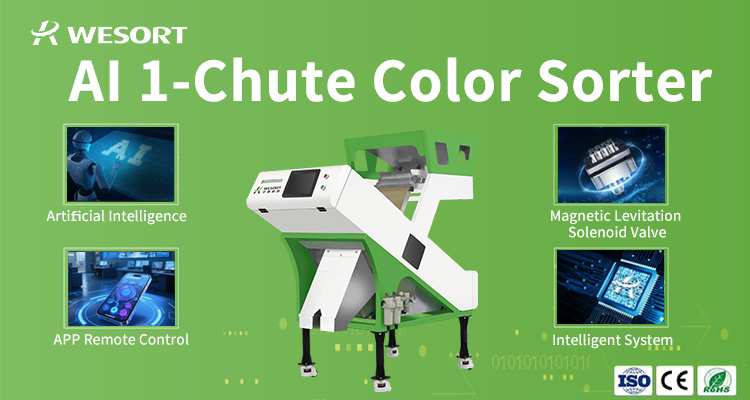
In modern agriculture, food processing, and recycling, quality control plays a vital role. This is where an optical sorter comes in. Many buyers often ask: What is an optical sorter? What does it do? How much does it cost? And how is WESORT optical...
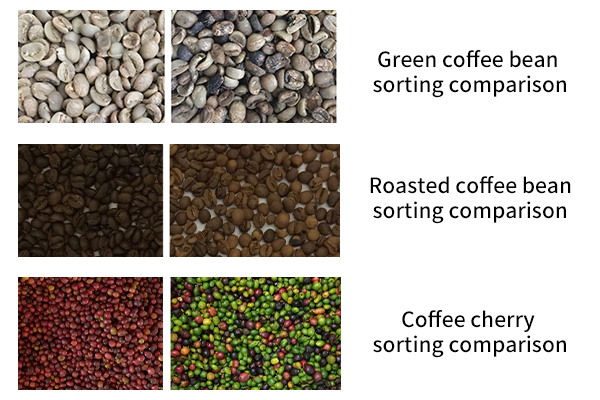
In the coffee industry, the quality of the final cup often depends on the smallest details during processing. One crucial step is removing defective beans, foreign materials, and color inconsistencies. This is where a coffee bean color sorter plays...

Coffee processing is a complex and meticulous task that involves several stages to transform raw coffee cherries into the high-quality beans we enjoy in our morning brew. One crucial step in this process is the sorting of coffee beans based on thei...
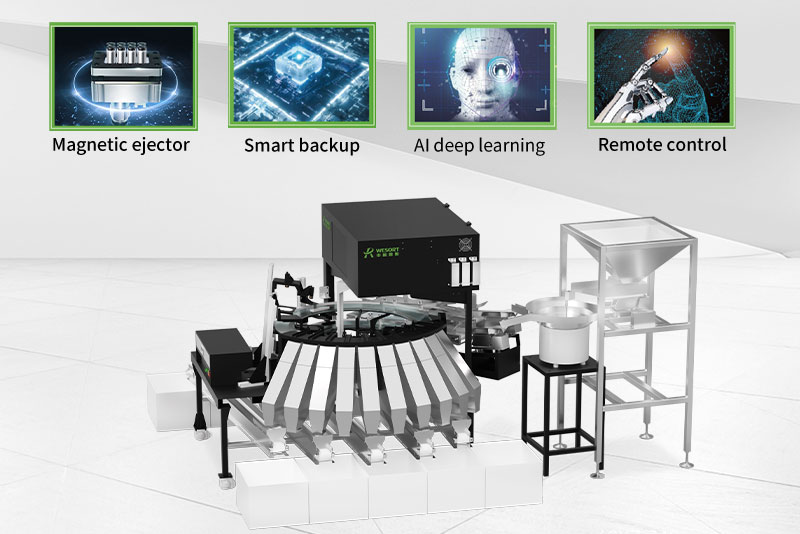
In the world of walnut processing, even the smallest imperfection can significantly impact product quality, market price, and brand reputation. Mold, insect damage, broken pieces, or inconsistent color are common defects that reduce the value of wa...
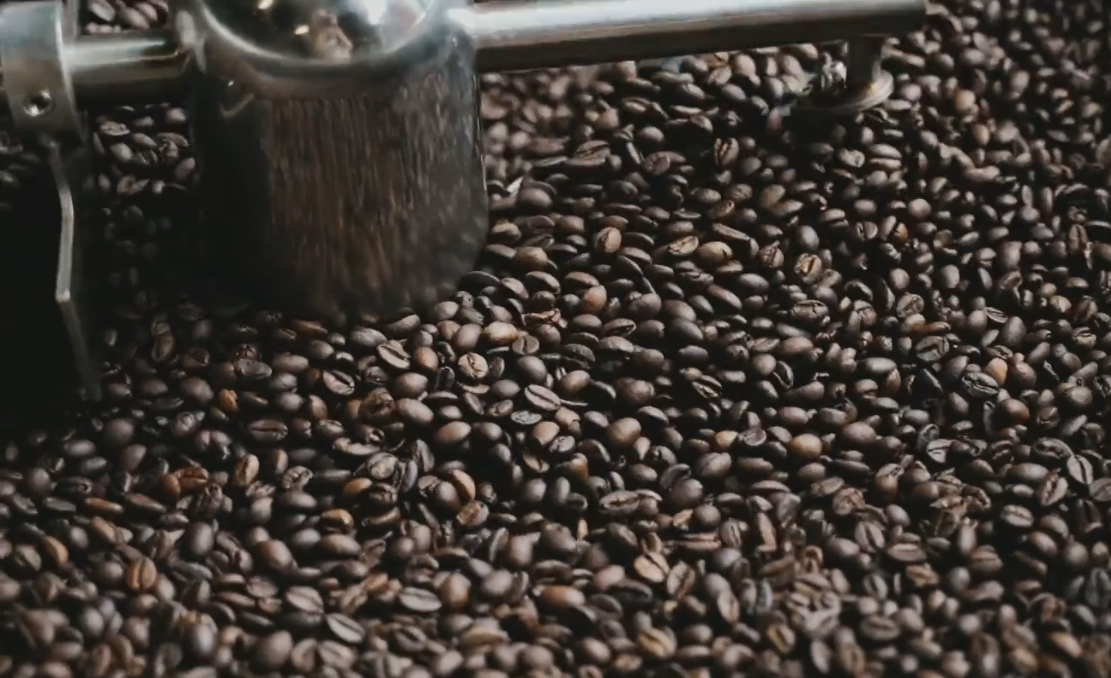
From green bean exporters to specialty coffee roasters, every producer faces the same challenge: how to remove defects efficiently while protecting valuable beans. Problems such as mold, fermentation damage, insect bites, black beans, broken beans,...
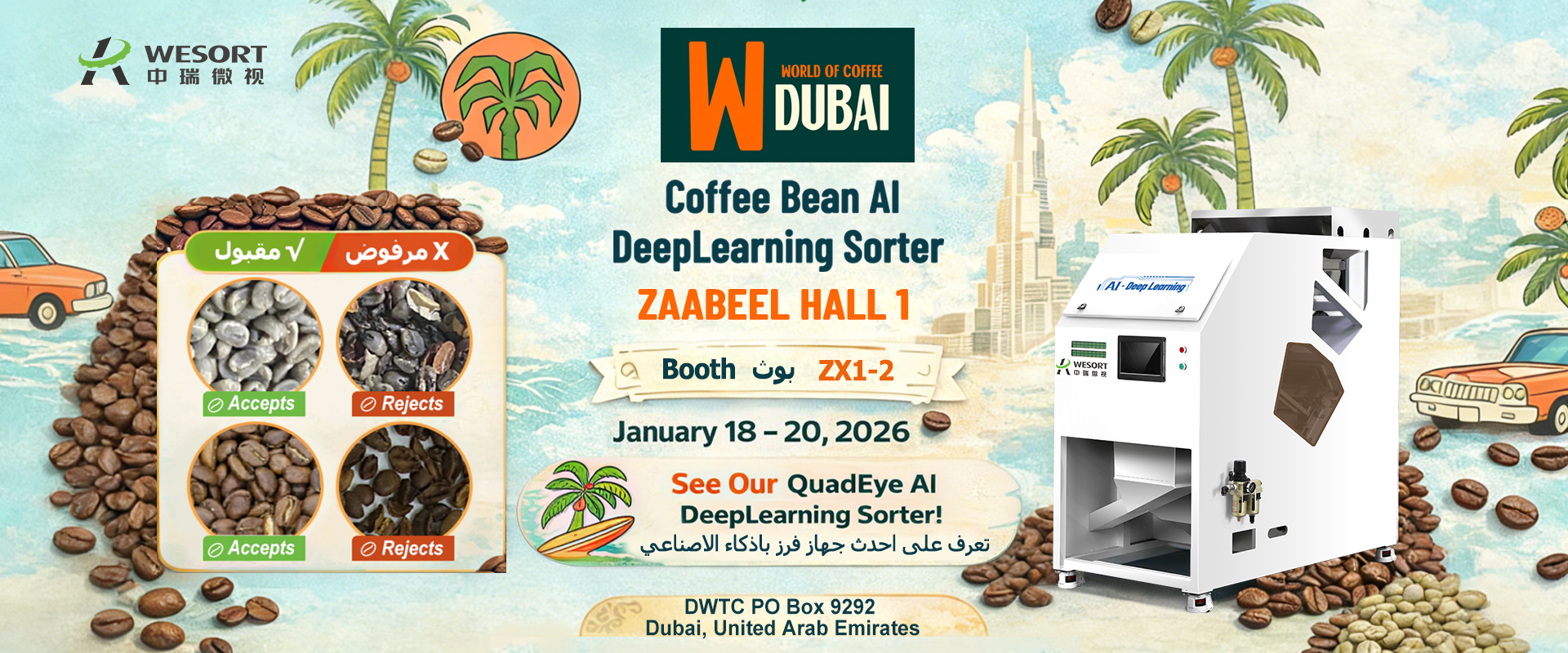
To meet the growing demand for premium and specialty coffee, sorting accuracy must go beyond traditional color-based systems. The QuadEye 360 AI Coffee Bean Sorter, developed by WESORT, represents the next generation of intelligent coffee bean so...
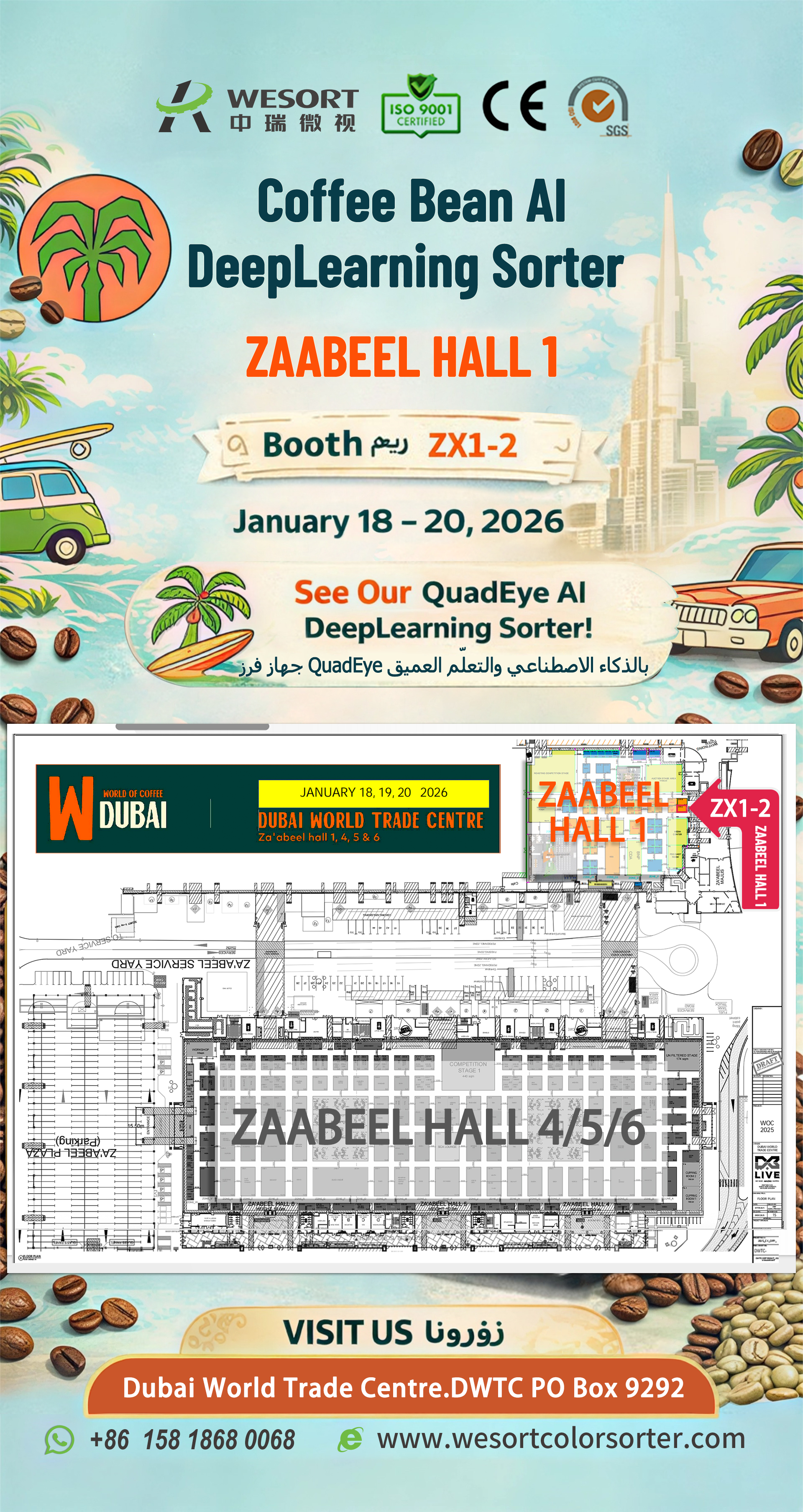
Dear friend, If you are attending World of Coffee Dubai 2026. we would like to invite you to visit WESORT. We will showcase our QuadEye 360 AI Coffee Bean Sorter, featuring 360° four-side inspection, AI deep learning models, near-zero breakage,...

Meta Description: Looking for the top hazelnut sorting machine manufacturer? WESORT offers advanced hazelnut color sorters with AI deep learning to efficiently remove defects, pests, and foreign materials. Boost your hazelnut processing efficienc...
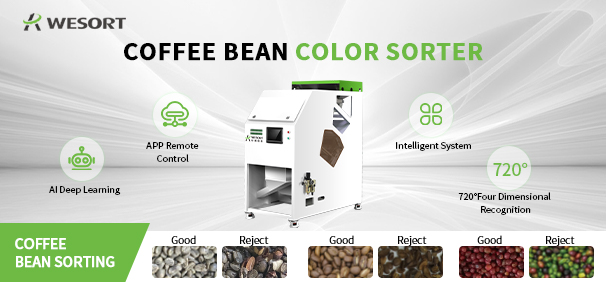
With the growing popularity of specialty coffee, the purity of coffee beans determines the aroma and taste of a cup of coffee. Achieving 99.9% purity requires high-performance coffee bean sorting equipment. Among Chinese coffee bean color sorter ma...
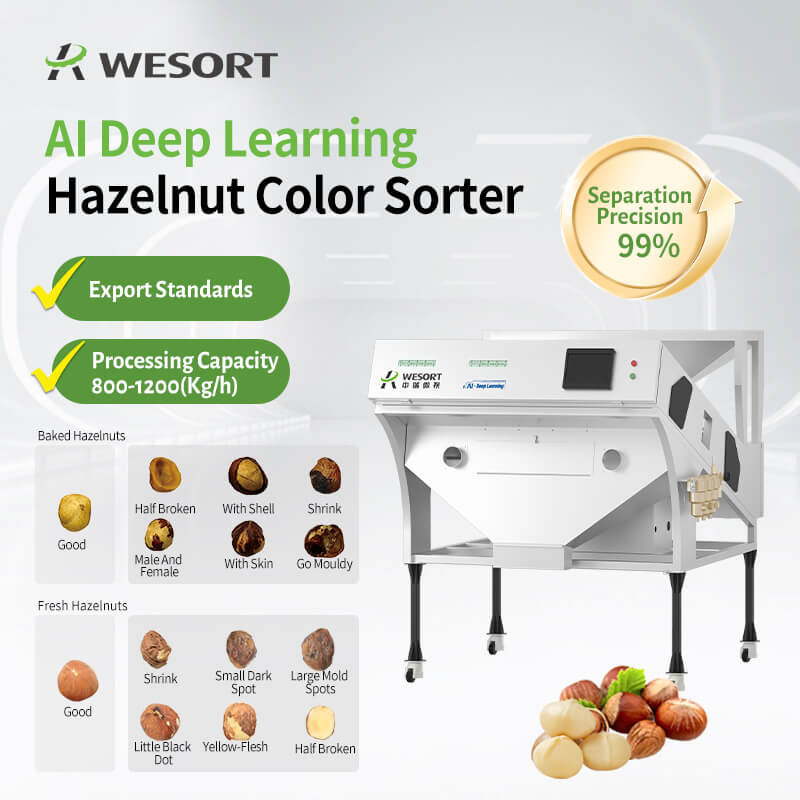
What's the most vexing issue in the hazelnut industry chain? It's not yield, but quality. Defects like mold, wrinkled skin, and foreign matter not only reduce product value but can also put export orders at risk. The solution isn't to increase the ...
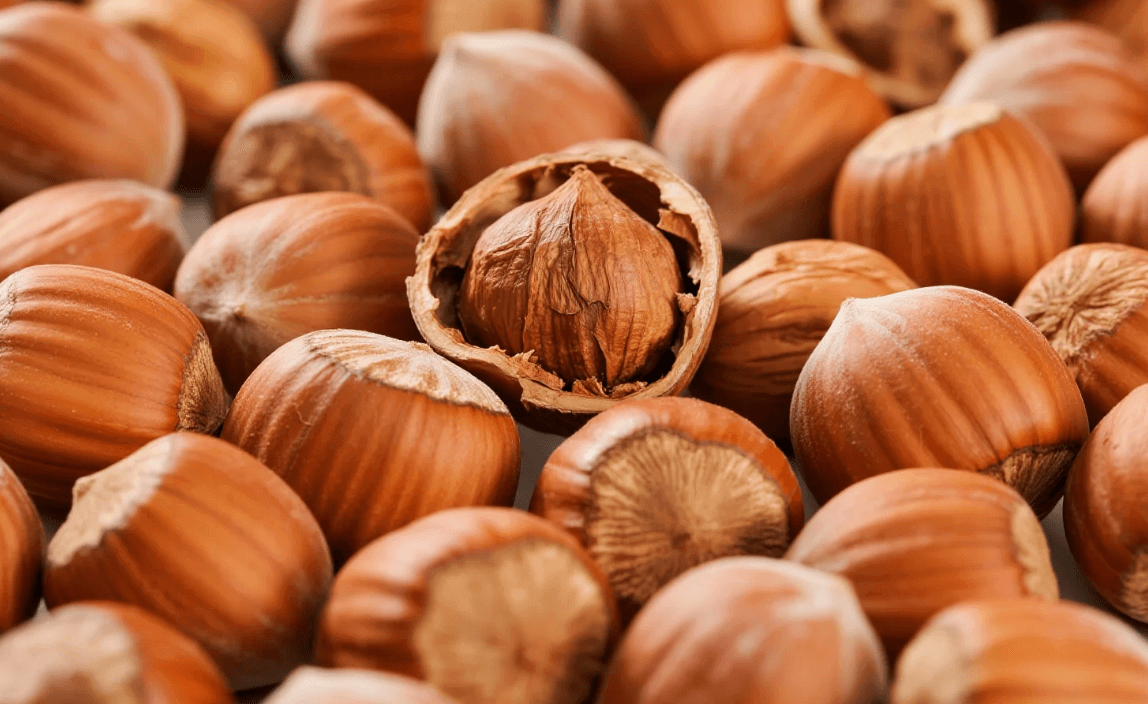
Every hazelnut tells a story—about the soil it grew in, the care during harvest, and the precision of its processing. Yet between farm and final product, hidden defects like mold, insect damage, and discoloration can turn premium hazelnuts into cos...
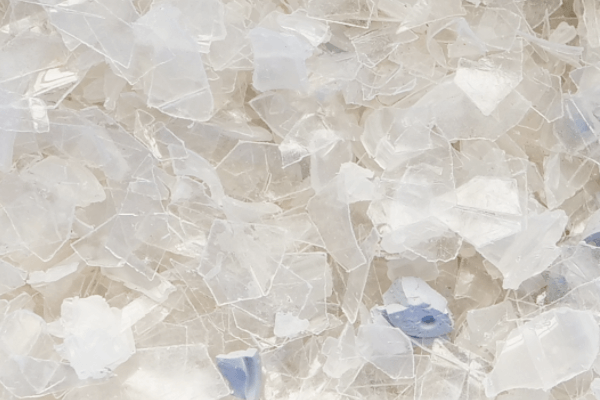
Plastic waste recycling is one of the most pressing challenges in today’s sustainability-driven world. Proper plastic sorting ensures high-quality recycled materials, reduces environmental impact, and improves profitability for recycling businesses...
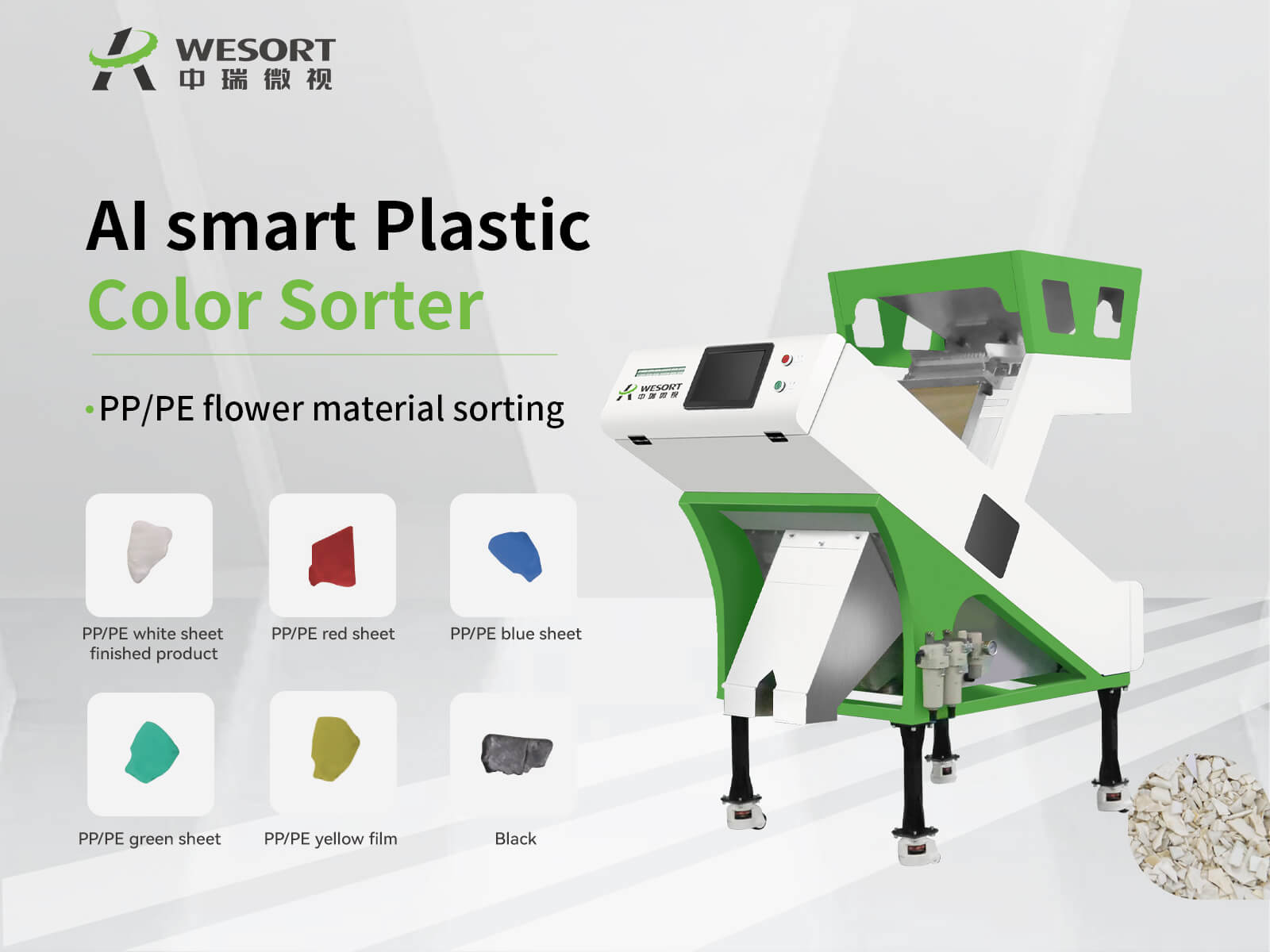
In the plastic recycling industry, purity and efficiency directly determine profitability. As global demand for recycled plastics increases, manufacturers need advanced solutions to separate impurities, improve yield, and ensure consistent product ...
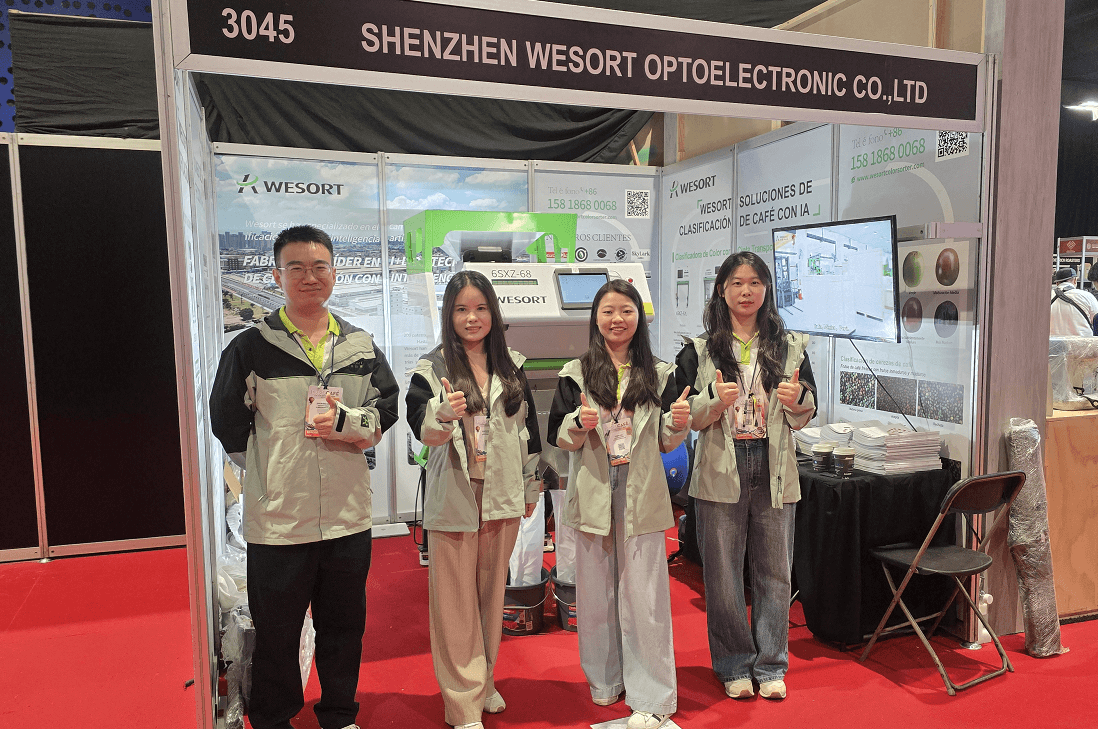
In Mexico, coffee is more than just a drink — it’s a culture, a tradition, and a vital industry. Yet, challenges like impurities, pest damage, and uneven coloration often diminish the value of even the most carefully cultivated beans. At EXPO CAFÉ...
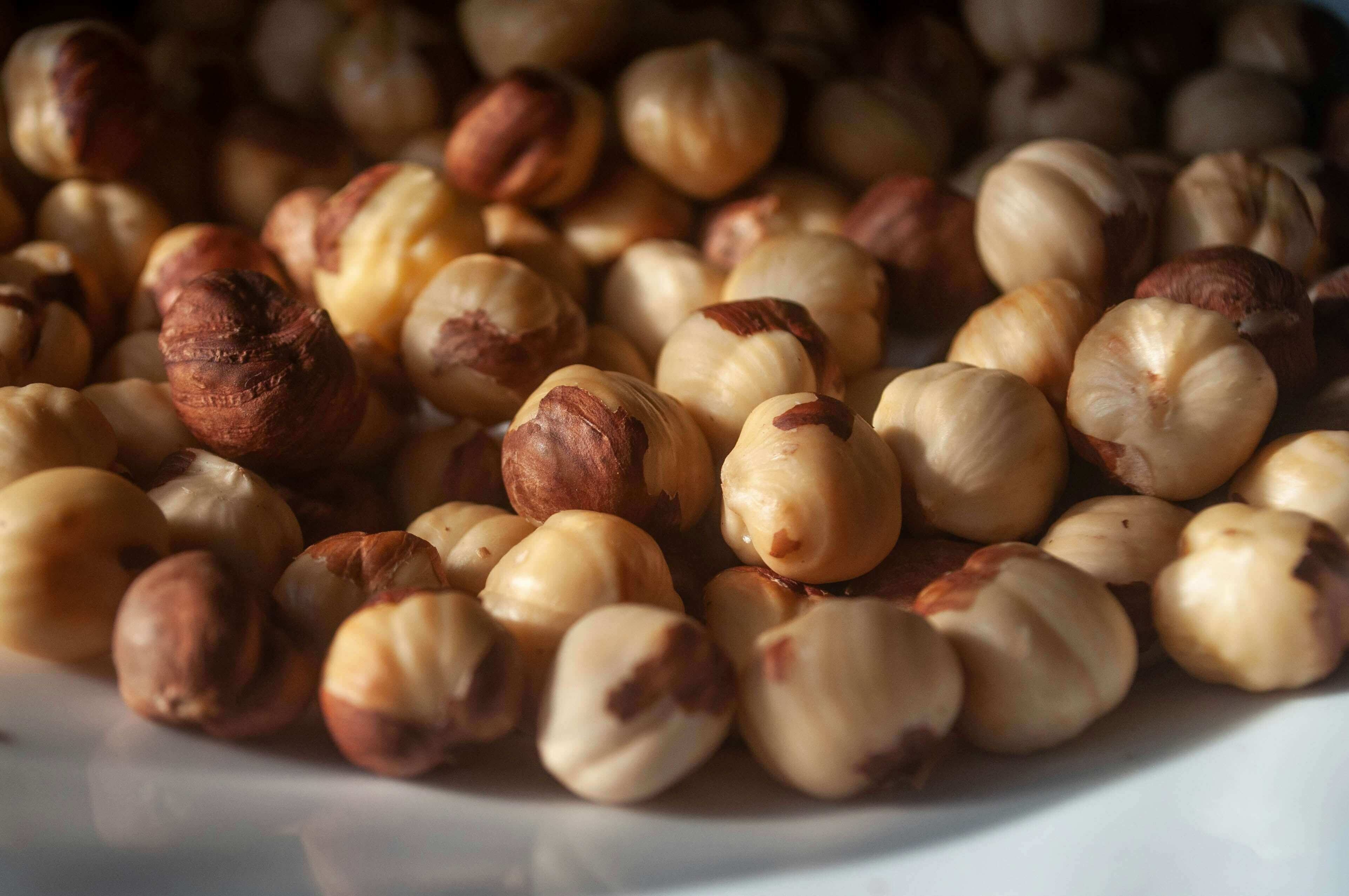
The global demand for hazelnuts continues to rise, driven by the growth of confectionery, bakery, and healthy snack markets. As consumption increases, so does the importance of quality control. Hazelnut processors face mounting pressure to deliver ...
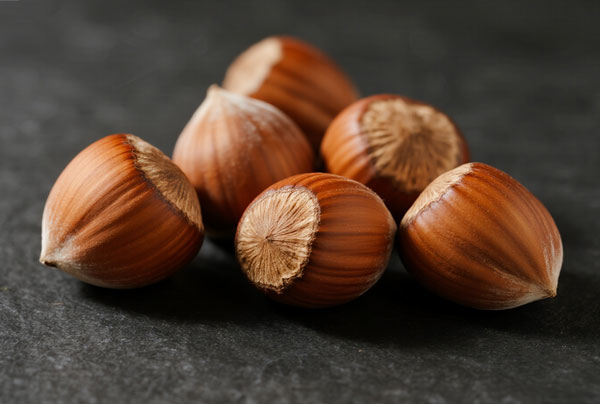
Hazelnuts are widely used in confectionery, bakery, and snacks, where product quality directly affects market value. However, hazelnut processing often faces serious challenges, such as pest infestation, seasonal labor shortages, and inconsistent m...
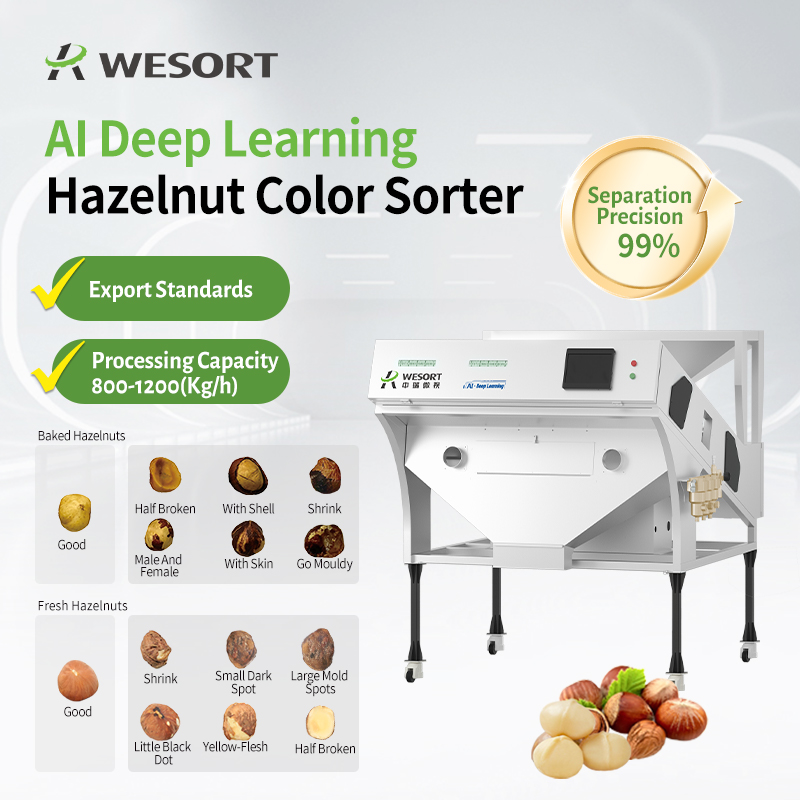
Hazelnut is the nut of the hazel and therefore includes any of the nuts deriving from species of the genus Corylus, especially the nuts of the species Corylus avellana. It is also known as cobnut or filbert nut according to species. A cob is roughl...
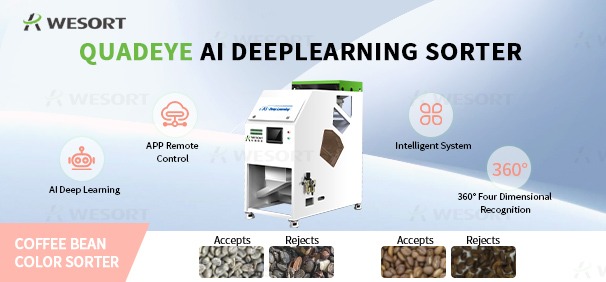
When you enjoy a smooth cup of coffee, you may not realize how much work goes into ensuring its purity and flavor. From harvest to cup, every step matters—and one of the most critical yet often overlooked stages is coffee bean sorting. Common Cof...
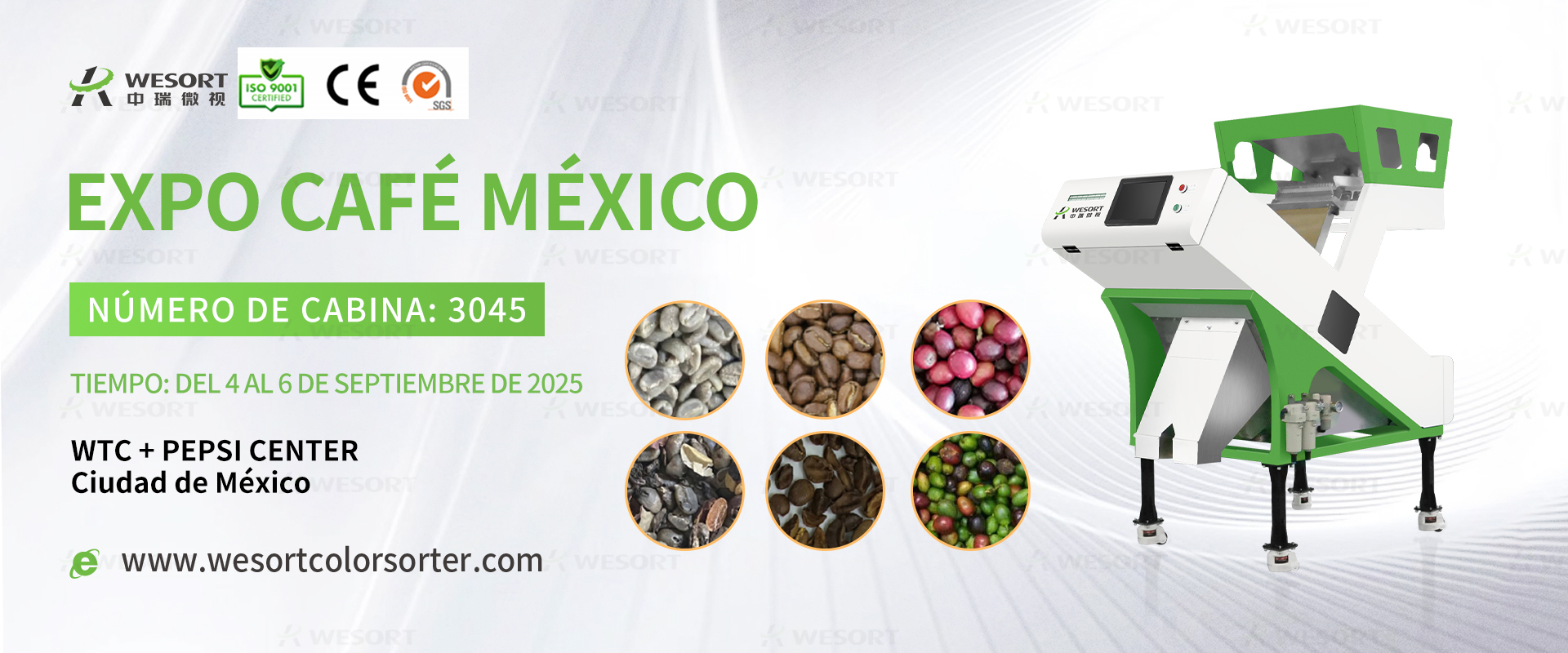
Dear Coffee Industry Partners, The Mexican Coffee Shop Expo 2025 is just around the corner—and WESORT , a leader in intelligent sorting technology, will be there to showcase our core solution for coffee processors: Coffee Bean Color Sorters. Mark...
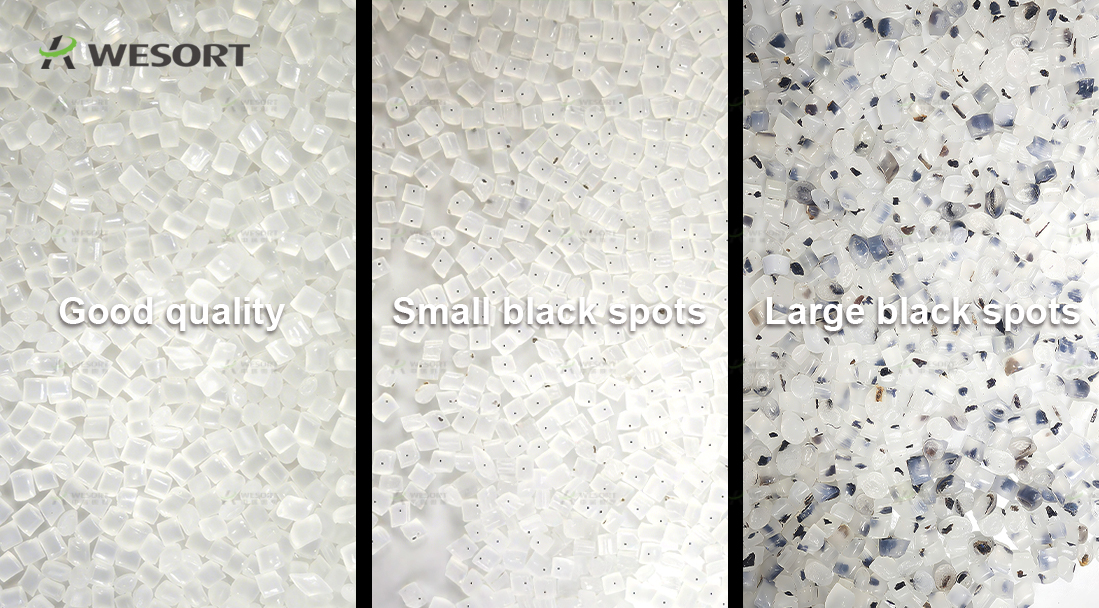
In the plastic pellet production process, color purity often directly determines the product's selling price and market competitiveness. Especially for transparent, white, or light-colored plastic pellets, even tiny black specks can affect the appe...

In modern agriculture, food processing, and recycling, quality control plays a vital role. This is where an optical sorter comes in. Many buyers often ask: What is an optical sorter? What does it do? How much does it cost? And how is WESORT optical...

In the coffee industry, the quality of the final cup often depends on the smallest details during processing. One crucial step is removing defective beans, foreign materials, and color inconsistencies. This is where a coffee bean color sorter plays...

Coffee processing is a complex and meticulous task that involves several stages to transform raw coffee cherries into the high-quality beans we enjoy in our morning brew. One crucial step in this process is the sorting of coffee beans based on thei...

In the world of walnut processing, even the smallest imperfection can significantly impact product quality, market price, and brand reputation. Mold, insect damage, broken pieces, or inconsistent color are common defects that reduce the value of wa...

From green bean exporters to specialty coffee roasters, every producer faces the same challenge: how to remove defects efficiently while protecting valuable beans. Problems such as mold, fermentation damage, insect bites, black beans, broken beans,...

To meet the growing demand for premium and specialty coffee, sorting accuracy must go beyond traditional color-based systems. The QuadEye 360 AI Coffee Bean Sorter, developed by WESORT, represents the next generation of intelligent coffee bean so...

Dear friend, If you are attending World of Coffee Dubai 2026. we would like to invite you to visit WESORT. We will showcase our QuadEye 360 AI Coffee Bean Sorter, featuring 360° four-side inspection, AI deep learning models, near-zero breakage,...

Meta Description: Looking for the top hazelnut sorting machine manufacturer? WESORT offers advanced hazelnut color sorters with AI deep learning to efficiently remove defects, pests, and foreign materials. Boost your hazelnut processing efficienc...